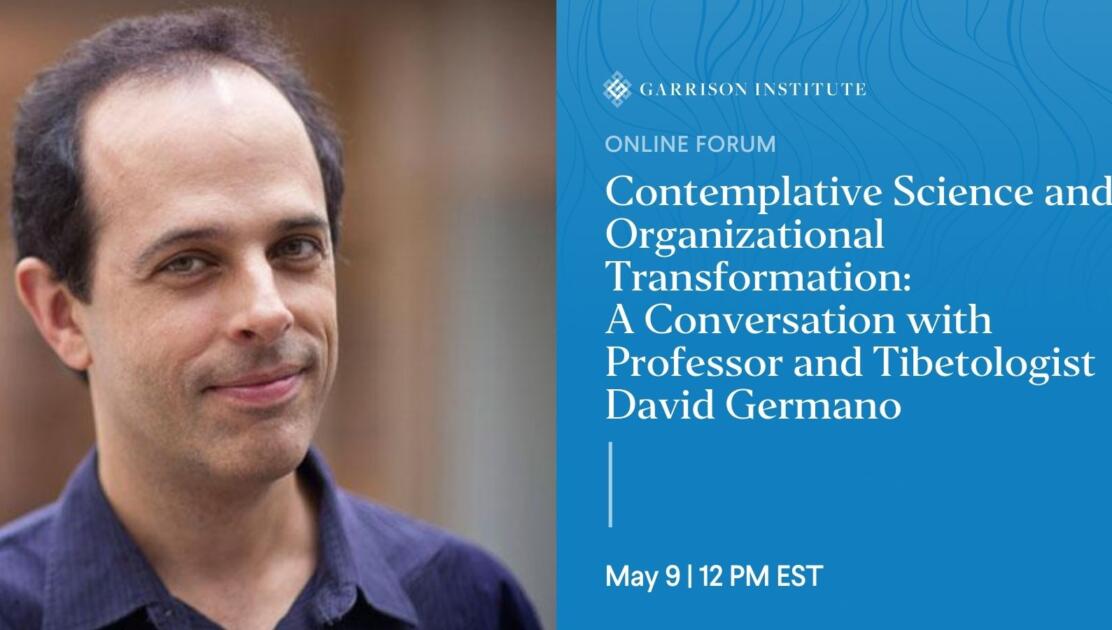Contemplative Science and Organizational Transformation with David Germano
When Karen Doyle Grossman started her tenure as executive director of the Garrison Institute, one of her first orders of business was inviting David Germano to join her in a forum.
Germano is the executive director of the Contemplative Sciences Center at the University of Virginia, where he teaches the Tibetan and Buddhist Studies. He also established the University of Virginia Tibet Center and Tibetan and Himalayan Library. In introducing Germano, Grossman spoke of appreciating his approach to contemplative practices.
“I’m so inspired by the way David thinks, and the way he brings an ethical framework and a very deep knowledge of contemplative practices and studies into his concepts about action,” she said. “He’s extremely engaged in the world while also having a deep contemplative practice. He’s a model for how we hope to be in the world – how we can be firmly grounded, knowledgeable, and fluent in ancient practices and perennial wisdom, while also harnessing innovative technologies and scientific research, in order to make the world a better place.”
In his opening remarks, Germano described the concept of “generative contemplation” as the topic that he’s most excited about.
“What excites me is the possibility of working deeply with the world’s contemplative legacy, as it’s enshrined in historical religions and other traditions of contemplative practice,” he said. “But I’m also excited about exploring creative approaches to the future, and how rootedness in the past can undergird transformative programs within educational environments. Making that connection between the past and future and theory and practice, and seeing how research, scholarship, and deep contemplative understanding can undergird new applications to address the compelling crises and problems we face in the present.”
Later, Grossman asked Germano about what people need to learn in order to be fluent in contemplative practices.
Germano said his answer is grounded in opening up contemplative practices so people with busier schedules and different interests can still access them.
“It’s an intense task to master the skills needed to be a doctor, lawyer, accountant, or computer scientist,” he said. “We don’t have the time and energy to learn Tibetan or Arabic and do a deep dive… part of my goal is to open up these practices, not simply as ‘here’s how you do it, one, two, three,’ but go below that level to, ‘here’s how these practices are generated and vary over time.’ I hope to help people feel enabled and empowered to have that level of understanding.”
He continued:
“I’m interested in working with others – contemplative teachers and scholars and scientists – to open up those deep contemplative practices and gain a sense of how these practices were generated in the first place. Why can one practice have literally a hundred different forms or variations? What’s the allowable variation? What’s not the allowable variation in this tradition?”
After a far-ranging and generative conversation, Grossman asked Germano about what he sees as the future of his work.
“We have to understand: What has changed materially in our kids’ environment that is producing these implosions of well-being that we’re seeing now, compared to 30, 40, or 50 years ago?” he asked. “Once we have that analysis, we can begin to think about designing solutions that take that reality in mind. The challenges are attentional toxicity; disconnection from each other, communities, and from the environment; and also the overwhelming pace, rapidity, and complexity of change this is outstripping their capacity to be resilient. We must help them build the needed resources for attentional restoration, reconnecting with each other, developing self-efficacy, and capacity to resiliently navigate changes.”
